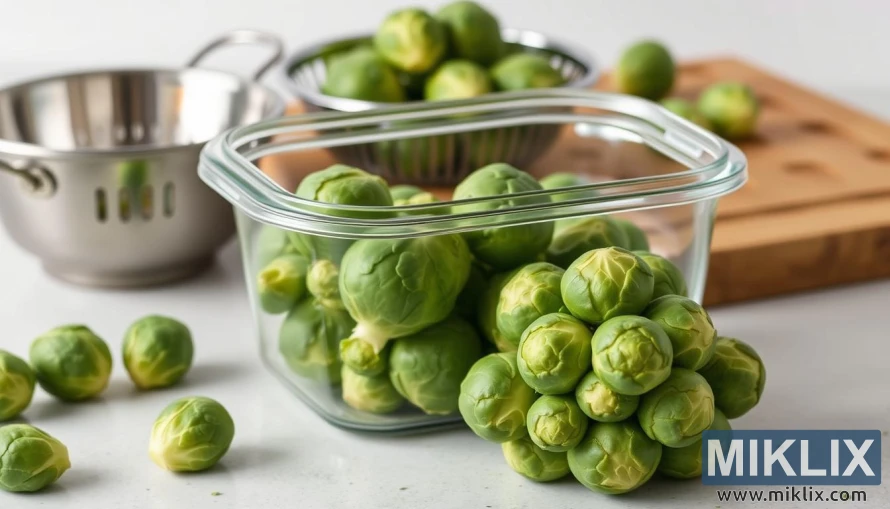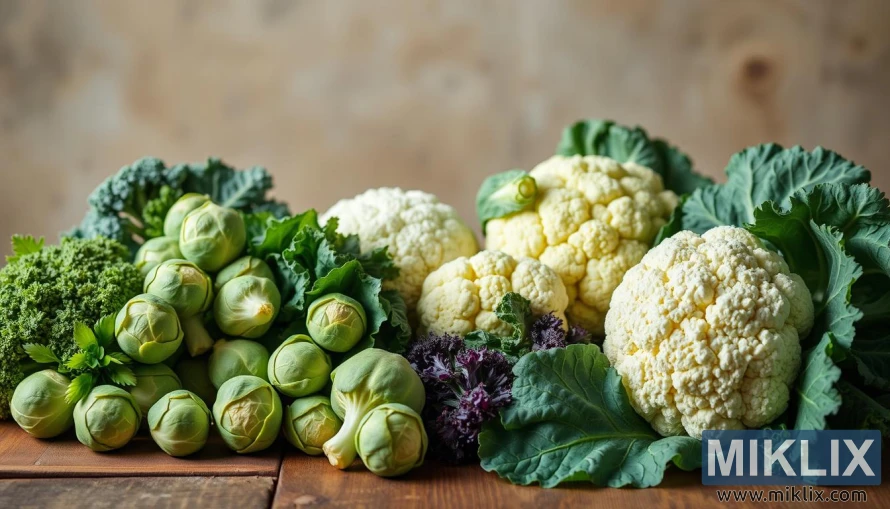Brussels Sprouts: Why These Little Greens Deserve the Spotlight
Published: March 30, 2025 at 9:03:30 PM UTC
Last updated: March 31, 2025 at 9:12:45 PM UTC
Brussels sprouts are more than just a trendy side dish. They belong to the Brassicaceae family, which includes broccoli, cabbage, kale, and cauliflower. These veggies are packed with vitamins and minerals, making them a great choice for your health. They are low in calories but high in nutrients. This makes them a key player in boosting your overall health. Let's explore how Brussels sprouts can improve your well-being. From their nutritional value to their antioxidant content, they offer many benefits.
Key Takeaways
- Brussels sprouts are nutrient-dense and low in calories.
- They are high in essential vitamins and minerals.
- Rich in antioxidants, which contribute to overall health.
- Provide significant dietary fiber, supporting digestion.
- They help maintain healthy blood sugar levels.
- Incorporating Brussels sprouts into your diet is easy and delicious.
Introduction to Brussels Sprouts
Brussels sprouts have a long history, starting in the 16th century in Belgium. They got their name from there. These small, cabbage-like veggies are part of the cruciferous family.
They are loved for their taste and how well they fit into many dishes. You can roast, steam, or sauté them. This makes them a favorite in many kitchens, loved by those who care about health and cooking.
High Nutritional Value of Brussels Sprouts
A half-cup of cooked Brussels sprouts, about 78 grams, has just 28 calories. Yet, they are packed with nutrients. They give you 91% of the daily vitamin K and 53% of vitamin C. Plus, they offer 12% of folate.
Brussels sprouts are also rich in minerals like potassium, iron, magnesium, and phosphorus. These minerals are key for health and body functions. With over 3 grams of fiber in one cup, they boost digestion and help control blood sugar.
Adding Brussels sprouts to your meals makes them healthier and more flavorful. They are a great way to get more vitamins and minerals without adding many calories. This makes them a smart choice for a healthier lifestyle.
Rich in Antioxidants
Brussels sprouts are full of antioxidants like glucosinolates and carotenoids. These compounds fight oxidative stress and reduce cell damage from free radicals. Glucosinolates can turn into isothiocyanates, which fight cancer.
These isothiocyanates stop cancer cells from growing and help kill them. This is key in getting rid of cancer cells.
Carotenoids in Brussels sprouts, like lutein and zeaxanthin, are great for your eyes. They block harmful blue light and lower the risk of eye diseases. Eating Brussels sprouts regularly gives your body antioxidants and helps with cancer prevention and eye health.
High Fiber Content
Brussels sprouts are a great source of dietary fiber. Each serving of cooked sprouts has about 2 grams. This fiber is key for a healthy gut, helping your digestive system work well.
Eating Brussels sprouts regularly helps with digestion. It keeps your bowel movements regular and prevents constipation. This is because of the fiber they contain.
Adding more fiber to your diet can also help your heart. Research shows that eating more fiber can lower your risk of heart disease. These sprouts are not just good for digestion; they also boost your overall health.
Brussels Sprouts and Vitamin K
Brussels sprouts are packed with vitamin K, a key nutrient for blood clotting and bone health. This vitamin helps control calcium levels, keeping bones strong. Eating foods like Brussels sprouts supports healthy bones and metabolism.
If you're on blood-thinning meds, watch your vitamin K intake. Talk to a doctor to find the right balance. This way, you can enjoy Brussels sprouts safely.
Supporting Healthy Blood Sugar Levels
Brussels sprouts are great for your health, not least in controlling blood sugar. A half cup of cooked sprouts has 2 grams of fiber. This fiber helps slow down sugar absorption, keeping your energy steady.
Studies show eating more Brussels sprouts and similar veggies can lower diabetes risk. A big study with over 200,000 people found evidence pointing to those eating the most Brussels sprouts having a 19% lower risk of type 2 diabetes.
Reducing Inflammation with Brussels Sprouts
Chronic inflammation can lead to serious health issues like heart disease and cancer. Brussels sprouts are packed with antioxidants and glucosinolates. They have strong anti-inflammatory effects that can fight this risk. Adding these veggies to your meals can make your diet anti-inflammatory, boosting your health.
Here are some reasons why Brussels sprouts are key in fighting chronic inflammation:
- They are full of antioxidants that lower oxidative stress in the body.
- Glucosinolates in them help with anti-inflammatory effects.
- They are low in calories but high in nutrients, perfect for any meal.
Eating Brussels sprouts regularly can make your diet better. It also helps your body fight inflammation. This is a delicious way to support your health.
Rich Source of Vitamin C
Brussels sprouts are a nutritional powerhouse, with a focus on vitamin C. A half-cup of cooked sprouts gives you about 48 mg of this key nutrient. Vitamin C is essential for a strong immune system, repairing tissues, and making collagen. It's vital for staying healthy.
Vitamin C also helps your body absorb iron better. This is great for those who eat mostly plants. Brussels sprouts are full of non-heme iron. Adding them to your meals boosts iron absorption, keeping your iron levels up and supporting your health.
Easily Incorporating Brussels Sprouts into Your Diet
Brussels sprouts are easy to add to your meals because they're so versatile. You can cook them in many ways. Try roasting them for a crispy texture, sautéing for a quick side, or boiling for a soft bite.
For a simple dish, just cut off the ends and roast them with olive oil, salt, and pepper. This brings out their natural taste and adds a nice crunch. You can also add raw sprouts to salads for a fresh, crunchy texture and a nutritional boost.
Here are some quick cooking methods to try:
- Roasting: Toss with your favorite seasonings and bake until golden.
- Sautéing: Cook in a skillet with garlic and olive oil for added flavor.
- Boiling: Boil until tender for a softer option.
- Shredding: Shredded sprouts can be added to coleslaw or mixed into puddings.
Brussels sprouts are easy to fit into your diet because of their versatility. They can be a tasty side dish or a key ingredient in your main course. They add flavor and nutrition to any meal.
Tips for Buying and Storing Brussels Sprouts
When picking Brussels sprouts, choose those that are firm and bright green. Avoid any with yellowing or decay signs. The sprouts' quality affects their taste and nutrition.
After picking the right sprouts, storing them properly is key. They can stay fresh in the fridge for up to 10 days if unwashed and untrimmed. Store them in a plastic bag or airtight container in the crisper drawer.
Before cooking, remove any bad leaves and trim the stems. Then, wash them well under running water. This way, you'll enjoy them for a longer time.
Culinary Uses of Brussels Sprouts
Brussels sprouts add a delightful flavor to many meals. Their mild, nutty taste makes them a great addition. When cooked right, they become a key ingredient in many recipes.
These veggies are perfect for both side dishes and main courses. Try roasting them until they're crispy for a better taste and texture. Adding garlic or balsamic vinegar can make them even more delicious.
- Stir-fries, providing a crunchy contrast to tender ingredients
- Salads, where they can be shredded raw for added crunch
- Soups, a hearty, nutritious component
Whether you're a seasoned cook or new to Brussels sprouts, there's a world of tasty recipes waiting for you. You can create dishes that please any taste buds.
Potential Risks of Consuming Brussels Sprouts
Brussels sprouts are good for your health, but there are some things to watch out for. If you're taking blood thinners like warfarin, be careful. They're full of vitamin K, which helps your blood clot.
It's important to keep your vitamin K intake steady. Eating too much can mess with your blood thinners. This could lead to problems. Always talk to your doctor before eating a lot of Brussels sprouts while on blood thinners.
Brussels sprouts also belong to the cruciferous family. This can be tough for people with irritable bowel syndrome (IBS). They have complex carbs and fiber that might be hard to digest.
This can cause gas, bloating, and discomfort. If you have IBS, watch how your body reacts. It's best to check with your doctor before adding them to your diet.
Research and Studies on Brussels Sprouts
Many scientific studies have shown the health benefits of Brussels sprouts. They play a key role in a balanced diet. These studies found that Brussels sprouts can help lower the risk of some cancers and improve overall health.
Brussels sprouts are packed with vitamins and minerals. They can help reduce inflammation and support heart health. Many people enjoy their taste and the health perks they bring.
Comparison with Other Cruciferous Vegetables
The cruciferous family includes veggies like broccoli, cauliflower, and kale. Each one brings its own health perks to a balanced diet. Brussels sprouts, with their rich nutrient content, are a standout.
Brussels sprouts have more vitamin K and C than many other veggies in this group. They're great for those wanting to up their nutrient game. Their unique taste also makes meals more interesting.
Looking at dietary differences, Brussels sprouts pair well with other cruciferous veggies. Adding them to meals with broccoli or kale boosts nutrient variety. This keeps the health benefits of the cruciferous family in check.
Brussels Sprouts and Cancer Prevention
Brussels sprouts are more than just a tasty side dish. They are packed with beneficial compounds that help with health, mainly in cancer prevention. One key element is glucosinolates, known for fighting cancer.
Studies show that glucosinolates may help lower cancer risk. This includes cancers of the stomach, lungs, and breast. These compounds support the body's cells, helping to prevent cancer cell growth.
Eating Brussels sprouts can be fun and healthy. Try roasting, steaming, or adding them to salads. It's a great way to make your meals better and support your health.
Conclusion
Brussels sprouts are a nutritional powerhouse. They are full of vitamins and minerals that boost your health. Their fiber, antioxidants, vitamins K, and C are key to many health benefits.
Adding Brussels sprouts to your diet is a smart move for better health. They help fight inflammation, control blood sugar, and may even prevent cancer. This makes them a key part of a balanced diet.
Regularly eating Brussels sprouts can make your meals more interesting and improve your health. These veggies are more than just a side dish. They are essential for a healthy lifestyle.
Nutrition Disclaimer
This page contains information about the nutritional properties of one or more food items or supplements. Such properties may vary worldwide depending on harvest season, soil conditions, animal welfare conditions, other local conditions, etc. Always make sure to check your local sources for specific and up-to-date information relevant to your area. Many countries have official dietary guidelines that should take precedence over anything you read here. You should never disregard professional advice because of something you read on this website.
Furthermore, the information presented on this page is for informational purposes only. While the author has put reasonable effort into verifying the validity of the information and researching the topics covered here, he or she is possibly not a trained professional with a formal education on the subject matter. Always consult with your physician or a professional dietician before making significant changes to your diet or if you have any related concerns.
Medical Disclaimer
All content on this website is for informational purposes only and is not intended to be a substitute for professional advice, medical diagnosis, or treatment. None of the information here should be considered medical advice. You are responsible for your own medical care, treatment, and decisions. Always seek the advice of your physician or another qualified healthcare provider with any questions you may have regarding a medical condition or concerns about one. Never disregard professional medical advice or delay seeking it because of something you have read on this website.



